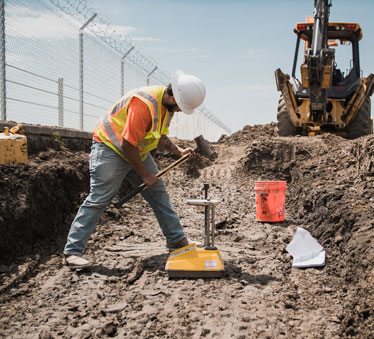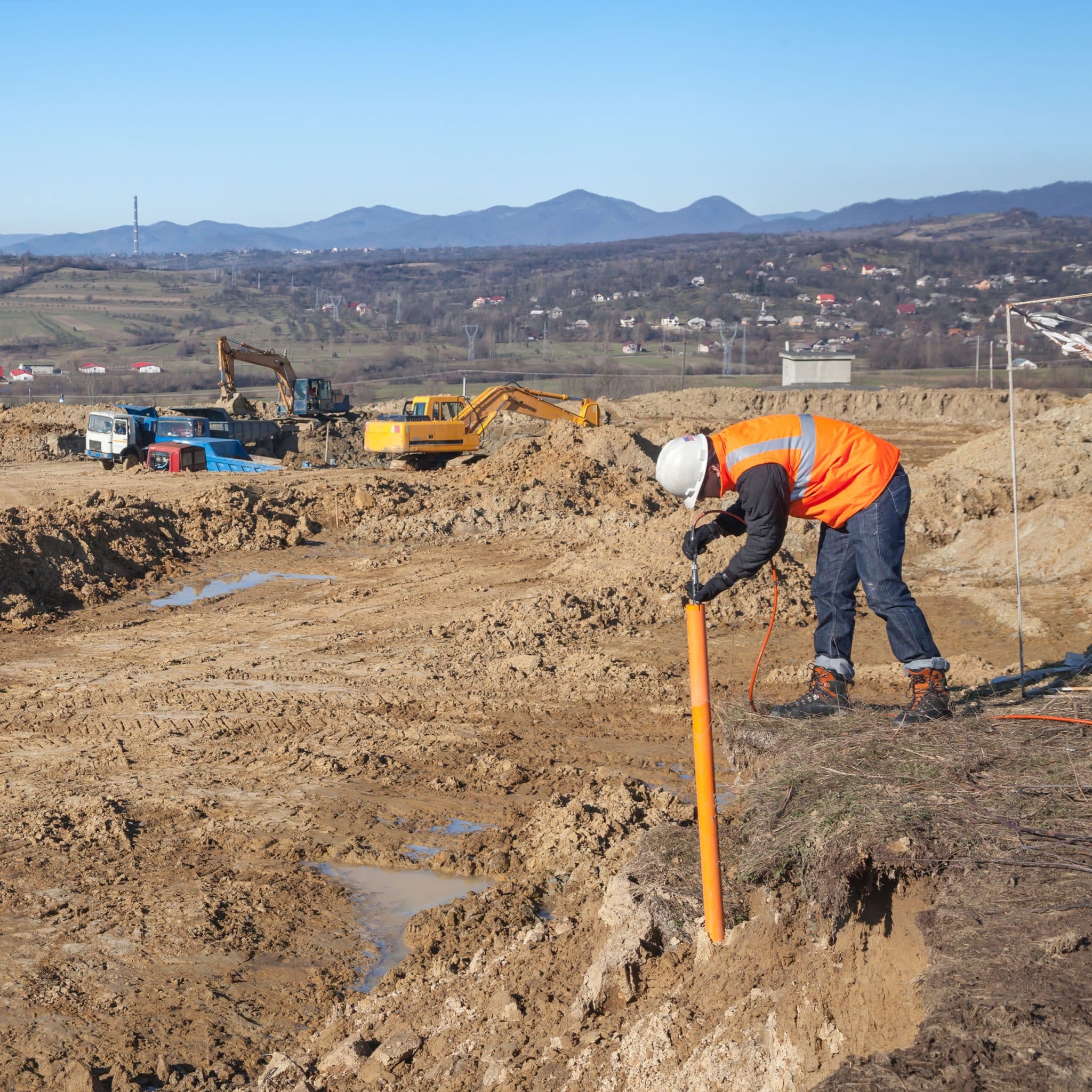Navigating the Complexities of Geotechnical Eng Projects
Navigating the Complexities of Geotechnical Eng Projects
Blog Article
An In-depth Overview of the Trick Responsibilities of Geotechnical Engineers in Website Characterization and Ground Improvement Methods for Design Solutions
Geotechnical engineers are indispensable to the effective implementation of engineering jobs, tasked with the essential duties of site characterization and the application of ground improvement techniques. Their work entails an extensive analysis of subsurface conditions, employing numerous screening methods to recognize soil and rock buildings.
Function of Geotechnical Engineers
Geotechnical engineers play an essential function in the layout and building and construction of facilities by examining the behavior of soil and rock below the surface - geotechnical eng. Their responsibilities incorporate reviewing subsurface conditions to inform layout decisions that make sure architectural security and security. By conducting detailed analyses of soil residential properties, consisting of shear strength, permeability, and compressibility, geotechnical designers provide important information that influences the selection of appropriate building and construction materials and strategies
Along with examining dirt mechanics, geotechnical engineers are tasked with identifying potential dangers such as landslides, sinkholes, and ground negotiations. Their know-how aids reduce risks related to these geotechnical phenomena, therefore shielding both the environment and public security. They additionally team up closely with other design techniques, making sure that geotechnical factors to consider are incorporated into total task style.
Additionally, geotechnical designers engage in the assessment of existing structures, offering referrals for retrofitting and repairs when needed. Their extensive understanding of soil-structure communication is important for the advancement of sustainable framework solutions. On the whole, the function of geotechnical engineers is essential to the effective awareness of building and construction jobs, ensuring they are risk-free, durable, and certified with regulatory requirements.

Site Characterization Processes
Effective site characterization procedures are essential for understanding the subsurface problems that influence project style and implementation. Geotechnical designers employ a systematic technique to gather, examine, and interpret data pertaining to soil, groundwater, and rock features. This procedure starts with a complete review of existing literature and historical website information, offering understandings right into previous website conditions and potential challenges.

Data evaluation follows fieldwork, where designers make use of geostatistical techniques to analyze searchings for and produce geological versions. This modeling aids in determining possible geohazards, such as landslides or liquefaction, which are vital for threat assessment. Subsequently, the outcomes notify design referrals, guaranteeing that engineering remedies are both reliable and secure. With diligent website characterization, geotechnical engineers prepared for successful job implementation, optimizing and reducing unpredicted complications resource allowance.
Dirt and Rock Screening Techniques
While recognizing subsurface problems is critical, the selection of suitable soil and rock testing methods is equally important for precise analysis and design. Geotechnical engineers employ a variety of testing methods to examine the mechanical and physical residential properties of dirt and rock materials.
Laboratory tests, such as Atterberg restrictions, grain dimension evaluation, and unconfined compressive stamina tests, provide important data on dirt actions under different moisture conditions and filling circumstances. These tests assist identify soil category and anticipate negotiation or shear stamina characteristics critical for structure design.
In-situ testing methods, including Standard Infiltration Tests (SPT), Cone Penetration Tests (CPT), and stress meter examinations, enable engineers to collect data directly from the ground. These approaches supply useful insights right into the soil's thickness, uniformity, and stratification without the need for extensive tasting.
Rock screening normally includes core sampling and research laboratory analysis to analyze properties like uniaxial compressive strength and rock quality classification (RQD) With each other, these soil and rock screening techniques make it possible for geotechnical engineers to make enlightened choices regarding site-specific difficulties, guaranteeing the safety and security of engineering options.
Ground Improvement Methods
Ground renovation methods are important for boosting the engineering properties of soil, therefore enhancing its load-bearing capability and decreasing negotiation. These approaches are essential in resolving difficulties offered by weak or troublesome dirts, which can considerably impact the security and sturdiness of frameworks.
Various ground improvement methods are utilized, consisting of compaction, grouting, and dirt stablizing. Grouting, on the various other hand, entails infusing a liquid product right into the ground to fill voids and improve dirt communication.
Dirt stablizing includes a series of techniques, from chemical ingredients to mechanical treatments, targeted at improving the soil's resistance to erosion and contortion. Strategies such as lime stablizing or cement mixing modify the residential or commercial properties of the soil at a particle degree, improving its total efficiency.
Importance of Geotechnical Analyses
Geotechnical analyses play a crucial duty in the planning and layout of engineering projects, as they supply vital information concerning the subsurface conditions. Recognizing soil residential or commercial properties, rock developments, groundwater levels, and possible geohazards is important for ensuring the security and safety of frameworks. These assessments make it possible for engineers to make informed choices regarding website selection, layout specifications, and construction techniques.
The relevance of geotechnical evaluations expands beyond preliminary task phases; they are crucial in risk administration and price efficiency. By determining possible issues early, such as soil negotiation, slope instability, or extreme groundwater, designers can devise proper mitigation techniques, lowering the possibility of structural failings and pricey hold-ups. Furthermore, these evaluations sustain conformity with governing requirements and improve the sustainability of design practices.

Final Thought
In final thought, geotechnical designers are crucial to ensuring the security and stability of engineering tasks through detailed website characterization and ground enhancement strategies. geotechnical eng. Their organized approach to examining subsurface problems, combined with their suggestions for reliable ground modification, substantially boosts soil residential or commercial properties and load-bearing ability. The experience of geotechnical engineers not only assists in informed job preparation but additionally makes sure conformity with policies and promotes reliable communication amongst stakeholders, ultimately adding to successful engineering outcomes
Geotechnical geo tech engineering engineers play an essential duty in the design and building of facilities by examining the habits of soil and rock underneath the surface. By carrying out comprehensive analyses of soil residential properties, consisting of shear leaks in the structure, stamina, and compressibility, geotechnical engineers offer crucial data that influences the selection of appropriate construction products and strategies.
In enhancement to examining soil auto mechanics, geotechnical engineers are entrusted with recognizing possible dangers such as landslides, sinkholes, and ground settlements. Geotechnical engineers use a methodical technique to gather, evaluate, and analyze information concerning groundwater, rock, and dirt attributes. By determining potential concerns early, such as soil settlement, incline instability, or extreme groundwater, designers can design proper mitigation strategies, reducing the possibility of costly hold-ups and structural failings.
Report this page